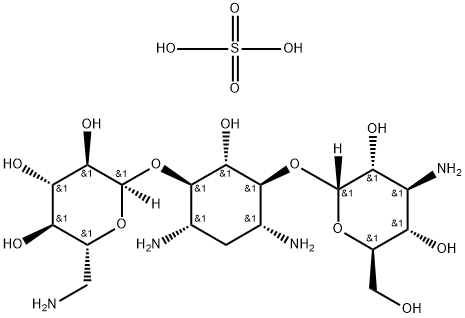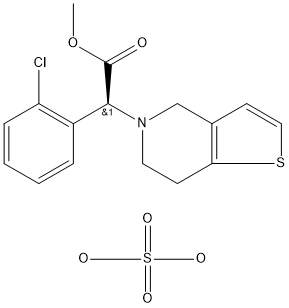Kanamycin sulfate , USPGrade, derived from Kanamycin chain mold , 25389-94-0
Synonym(s):
Kamycin;Kanamycin A;Kanamycin sulfate from Streptomyces kanamyceticus;Kanamycin sulfate salt;Kanamycin A
CAS NO.:25389-94-0
Empirical Formula: C18H38N4O15S
Molecular Weight: 582.58
MDL number: MFCD00070253
EINECS: 246-933-9
| Pack Size | Price | Stock | Quantity |
| 1g | RMB28.80 | In Stock |
|
| 5G | RMB62.40 | In Stock |
|
| 25G | RMB217.60 | In Stock |
|
| 100g | RMB523.20 | In Stock |
|
| 500g | RMB1990.40 | In Stock |
|
| others | Enquire |
PRODUCT Properties
| Melting point: | 250°C |
| alpha | +112~+123°(D/20℃)(c=1,H2O)(calculated on the dried basis) |
| Density | 1.3619 (rough estimate) |
| refractive index | 117.5 ° (C=1, H2O) |
| storage temp. | 2-8°C |
| solubility | H2O: 10-50 mg/mL As a stock solution. Stock solutions should be stored at 2-8°C. Stable at 37°C for 5 days. |
| form | powder |
| color | white to off-white |
| PH Range | 6.5 - 8.5 (1% solution) |
| biological source | Streptomyces kanamyceticus |
| Water Solubility | Soluble in water at 10mg/ml |
| Merck | 14,5281 |
| InChIKey | OOYGSFOGFJDDHP-KMCOLRRFSA-N |
Description and Uses
Kanamycin was found by Umezawa et al. in the culture broth of Streptomyces kanamyceticus in 1957. It is produced with other components, kanamycins B (bekanamycin) and C, which are also separated during the purification. The compound shows much lower toxicity than the earlier aminoglycosides, streptomycin and neomycin, and strong activity against a wide range of gram-positive and gram-negative bacteria, including Mycobacterium. Kanamycin has been used clinically for treatment of such serious infections as dysentery, salmonellosis, and tuberculosis.
Kanamycin sulfate is an antibacterial agent similar to neomycin.
Safety
| Symbol(GHS) |  GHS08 |
| Signal word | Danger |
| Hazard statements | H360D |
| Precautionary statements | P201-P202-P280-P308+P313-P405-P501 |
| Hazard Codes | T |
| Risk Statements | 61 |
| Safety Statements | 22-24/25-45-53 |
| WGK Germany | 3 |
| RTECS | NZ3225030 |
| HS Code | 29419020 |
| Toxicity | LD50 in mice: 20.7 g/kg orally; 1450 mg/kg i.p. (Zel'tser) |


![Methyl2-(2-chlorophenyl)-2-(6,7-dihydrothieno[3,2-c]pyridin-5(4H)-yl)acetatesulfate](https://img.chemicalbook.com/CAS/GIF/135046-48-9.gif)


